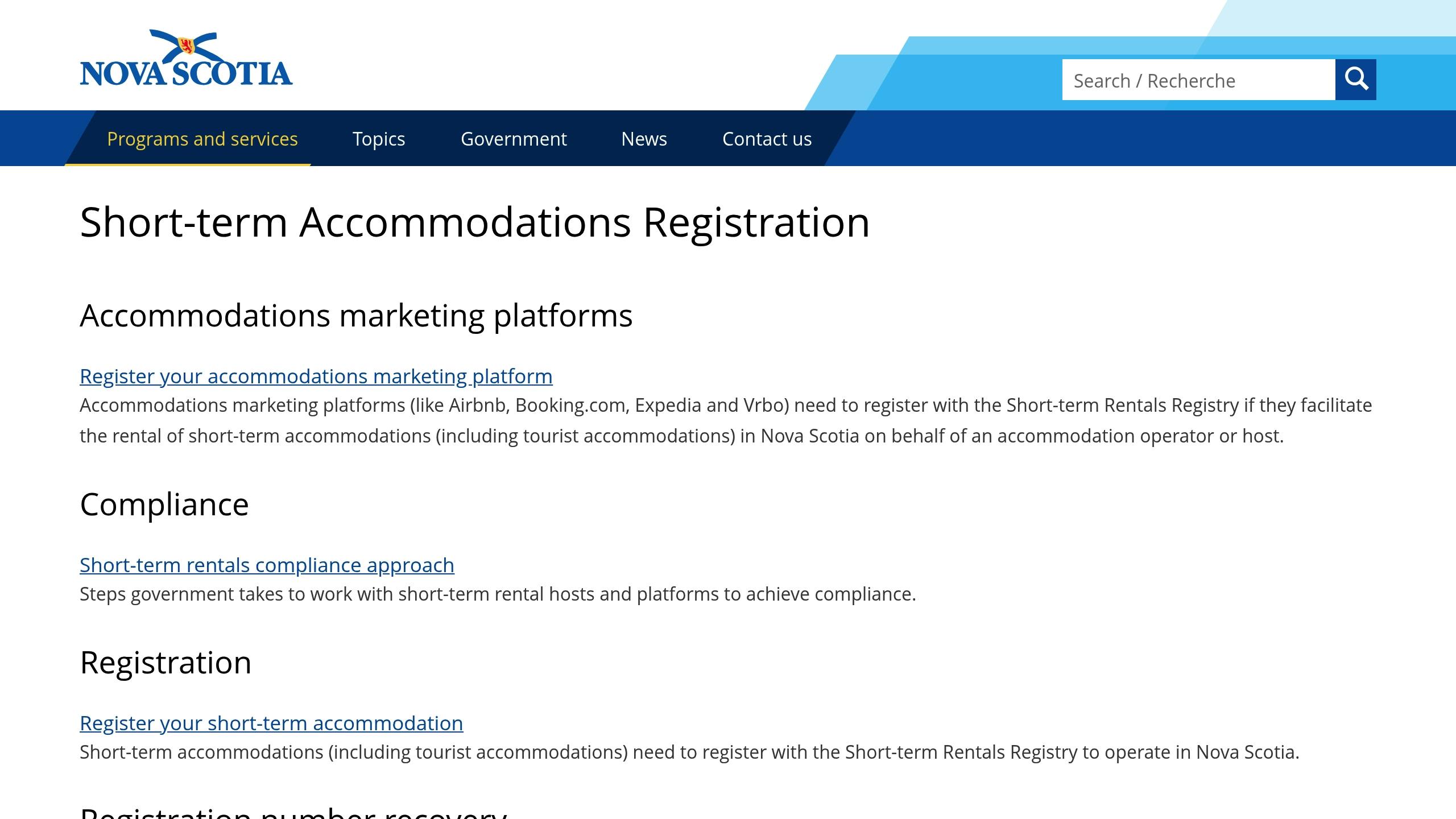Nova Scotia's booming tourism industry is reshaping short-term rental regulations to address housing shortages.
In 2023, the province welcomed 2.2 million visitors, generating $1.46 billion in spending. However, the growth of short-term rentals has worsened housing availability, prompting new rules under the Short-Term Rentals Registration Act.
Key Changes:
- Mandatory Registration: All short-term rentals must register annually with fees ranging from $50 to $2,000.
- Stricter Compliance: Proof of municipal by-law adherence and safety standards is required.
- Fines for Violations: Non-compliance penalties range from $1,000 to $100,000.
- Focus on Housing: With a projected housing deficit of 41,200 units by 2027, the regulations aim to balance tourism growth with community needs.
These changes increase costs and paperwork for property owners but aim to create fairness for all stakeholders. Solutions like professional property management services and alternative rental strategies can help landlords adapt while maintaining income.
Tourism and Short-Term Rental Market Data
Tourism Statistics and Economic Effects
Nova Scotia's tourism industry continues to thrive, bringing in over $3 billion annually and employing more than 50,000 residents [7]. In 2023, accommodation providers sold three million room nights, highlighting a strong year for the sector [7]. This success plays a key role in shaping the dynamics of the short-term rental market.
Visitor spending remains robust across both international and domestic markets, reflecting Nova Scotia's widespread appeal. Allan MacMaster, Minister of Communities, Culture, Tourism and Heritage, expressed optimism:
"Nova Scotia has so much to offer visitors, and it is wonderful to see tourism getting back on track and poised for growth" [7].
Short-Term Rental Market Growth
The short-term rental market has seen notable growth, with over 6,000 registered accommodations as of September 2023 [8]. However, this rapid expansion has sparked concerns about its impact on housing availability.
Industry voices are calling for balanced regulations. Wes Surrett, Chair of TIANS, highlighted the challenges faced by traditional operators:
"Nova Scotia's tourism businesses are required to meet a number of regulations to operate and, for too long, the proliferation of short-term rentals has created an unlevel operating environment for operators who pay commercial taxes and licensing fees, and who meet safety and regulatory requirements. This is a step in the right direction" [3].
Housing shortages remain a pressing issue. Recent projections estimate a deficit of 41,200 housing units by 2027/28, emphasizing the urgency of finding a middle ground [1].
| Tourism Impact Metrics (2023) | Value |
|---|---|
| Total Visitors | 2.2 million |
| Year-over-Year Growth | 14% |
| Room Nights Sold | 3 million |
| Tourism Employment | 50,000+ jobs |
| Annual Revenue | $3+ billion |
The numbers highlight the challenge of balancing tourism's economic benefits with the need to ensure enough housing for residents. As visitor numbers grow, the province must carefully manage the expansion of short-term rentals alongside addressing housing shortages.
Current Short-Term Rental Rules in Nova Scotia
Short-Term Rentals Registration Act Requirements

The Short-Term Rentals Registration Act (STRRA) requires property owners renting accommodations for less than 28 days to register with the Tourist Accommodations Registry. To complete registration, property owners need to provide:
- The property's civic address and the number of bedrooms or units
- Host contact details
- Proof of compliance with municipal land-use by-laws
- Additional property-specific documents [10]
These requirements aim to tackle housing and safety challenges while ensuring accountability.
Registration fees depend on the property's location and type:
| Property Type | Annual Fee |
|---|---|
| Primary Residence (up to 4 bedrooms) | $50 |
| Commercial – Tier 1 (Halifax area) | $2,000 |
| Commercial – Tier 2 (Other communities) | $500 |
| Commercial – Tier 3 (Selected towns) | $240 |
| Traditional Tourist (1–4 bedrooms) | $50 |
| Traditional Tourist (5+ bedrooms) | $150 |
Property owners are required to renew their registration annually by April 1st and must display their registration number on all booking platforms. Failing to operate with a valid registration number can lead to fines ranging from $1,000 to $100,000 per violation [1][9].
Reasons for New Rules
The updated registration requirements address various challenges faced by the industry and local communities. Housing Minister John Lohr shed light on the fee structure, stating:
"There was extensive consultations done and there was an extensive jurisdictional scan across North America. We're already, at the $2,000 level, near the highest in Canada" [4].
Darlene Grant Fiander, President of TIANS, emphasized the broader societal concerns:
"There are a number of issues that have arisen as a result of the unregulated growth of Short-Term Rentals, and the social impact on communities related to available housing is a significant one" [2].
The primary goals of these regulations include:
- Tackling housing shortages
- Ensuring properties meet safety standards and municipal by-laws
- Aligning with municipal housing strategies [9]
Nova Scotia's approach mirrors similar efforts across Canada, aiming to balance the needs of the tourism industry with housing availability. The tiered fee system reflects the housing pressures in specific areas, with urban centers like Halifax facing higher costs [1].
Main Issues for Rental Property Owners
Rising Costs and Paperwork
Rental property owners in Nova Scotia are facing growing financial pressures due to new short-term rental regulations. These include a tiered registration fee system, with costs for commercial operators ranging from $240 to $2,000 annually, plus additional fees like zoning confirmation letters ($200) and development permits ($250). On top of that, owners must provide extensive documentation, including proof of property ownership, residence verification, and municipal compliance [1][11].
| Expense Type | Cost |
|---|---|
| Zoning Confirmation Letter | $200 |
| Development Permit | $250 |
These added expenses not only squeeze budgets but also cut into rental income, making it harder for owners to stay profitable.
Revenue Challenges
Higher operating costs and compliance fees are eating into profits. Minister of Municipal Affairs and Housing John Lohr highlighted the current housing landscape:
"Nova Scotia is facing an unprecedented housing crisis. We're working to get more housing built, but that takes time. In the meantime, houses and apartments that could be long-term homes are being rented short-term." [8]
This shift in focus has made it harder for short-term rental owners to maintain their income levels.
Compliance Struggles
The new regulations bring more than just financial hurdles - they're also creating significant compliance challenges for property owners:
- Navigating Local Bylaws: Owners must adhere to municipal land-use bylaws, often requiring consultations with planners and even property modifications [11].
- Complex Registration Process: With 7,235 short-term rentals registered in the province (2,160 in Halifax) as of July 30, 2024, many owners find it difficult to categorize their properties, collect the necessary documents, and meet municipal standards [4].
- Enforcement Risks: Fines for non-compliance range from $1,000 to $100,000, and the province is turning to private enforcement to monitor adherence [1][12].
The complexity of these requirements has led many owners to seek professional help. Companies like Kirin Property Management offer services to manage compliance and registration, helping owners protect their income while navigating the evolving regulatory landscape.
sbb-itb-00c8bef
Halifax Approves New Short-Term Rental Regulations
Steps to Meet Rules and Maintain Income
Navigating compliance challenges doesn't have to be overwhelming. Landlords can take practical steps to meet new requirements while ensuring their rental income remains steady.
Simplifying Rule Compliance
Start by handling registrations early. Register annually with the Provincial Tourist Accommodation Registry and complete the one-time registration with the Municipal Residential Rental Registry before deadlines. Nova Scotia's interactive mapping tool can help confirm land use and zoning rules. Make sure to gather all required documents in advance to speed up the process. Need zoning clarification? Just call 311 for assistance [11].
Once you're set up with the basics, technology can help simplify ongoing management tasks.
Property Management Software Solutions
Using property management tools can make it easier to stay compliant and improve rental performance. For example, Kirin Property Management offers AI-powered rent analysis that helps landlords maximize occupancy rates:
| Service Tier | Management Fee | Tenant Placement Fee | Key Features |
|---|---|---|---|
| Core (Under 3 Properties) | 9% | 50% of monthly rent | AI-driven CMA, Basic Services |
| Premium (Under 3 Properties) | 11% | 40% of monthly rent | Enhanced Services, Reduced Fees |
| Premium (Over 3 Properties) | 10% | 40% of monthly rent | Portfolio Discounts, Premium Support |
"I was skeptical about their 'AI rent analysis,' but it genuinely worked. Our vacancy went from five weeks down to one. That's thousands saved right there. And the monthly reports are super clear." [5]
If tech tools aren't enough, adjusting your rental strategy can also help boost income.
Alternative Rental Strategies
Strategic pricing can make a big difference. A Dartmouth landlord increased their monthly income by $150 with targeted pricing adjustments [5].
"We listed our condo at $200 more than we thought possible, and it was fully booked within two weeks! Kirin's CMA nailed the price, and we haven't had a day of vacancy since." [5]
Another option is to explore different rental markets. Consider student housing or medium-term rentals (3–6 months), which often face fewer restrictions. Adding high-demand amenities and using data-backed pricing can also enhance your rental's appeal and profitability under the new rules.
Housing Supply and Tourism Effects
The rise in tourism is putting extra pressure on housing in the province, creating noticeable challenges for residents and policymakers alike [1]. This growing demand directly impacts housing availability, prompting regulatory efforts to address the issue.
Housing Availability Issues
As of July 23, 2024, there were 7,193 short-term rentals registered in the province [6]. Many of these properties could otherwise serve as long-term homes, worsening an already tight housing market [6]. This shift highlights the need for immediate action to maintain housing access while still supporting the tourism sector.
Collaborative Strategies for Market Balance
Industry leaders are now pushing for coordinated efforts to address the tension between tourism's economic benefits and the need for community housing. The Tourism Industry Association of Nova Scotia (TIANS) has expressed support for regulations that aim to balance these interests. TIANS President Darlene Grant Fiander noted:
"There are a number of issues that have arisen as a result of the unregulated growth of Short-Term Rentals, and the social impact on communities related to available housing is a significant one. We anticipate an immediate positive economic impact for legitimate accommodation operators, as well as improved access to housing" [2].
TIANS Chair Wes Surrett also highlighted the importance of fairness in the tourism industry:
"Nova Scotia's tourism businesses are required to meet a number of regulations to operate and, for too long, the proliferation of short-term rentals has created an unlevel operating environment for operators who pay commercial taxes and licensing fees, and who meet safety and regulatory requirements. This is a step in the right direction" [2].
To address these challenges, new regulations introduce tiered fees and strict penalties for violations [6]. Property owners are encouraged to take several steps to support market balance, including: reviewing municipal land-use bylaws for short-term rental permissions [9], evaluating their property's location in relation to housing-stressed areas [9], considering converting properties to long-term rentals, and ensuring compliance with registration requirements [1].
Conclusion
Nova Scotia's booming tourism in 2023 reshaped the short-term rental market and led to new rules under the Short-Term Rentals Registration Act.
To tackle housing challenges, the province introduced registration fees and stricter penalties. With a projected housing shortfall of 41,200 units by 2027/28 [1], these measures aim to balance the economic gains from tourism with the pressing need for community housing.
Property owners are turning to professional services to navigate these changes. Companies like Kirin Property Management offer tech-driven tools that simplify compliance and boost rental income. This makes effective compliance and smart management essential in today’s market.
Collaboration between property owners, regulators, and management experts is key to maintaining housing availability while benefiting from tourism's economic impact. Achieving this balance requires strong regulations and reliable management solutions that serve both residents and visitors.



